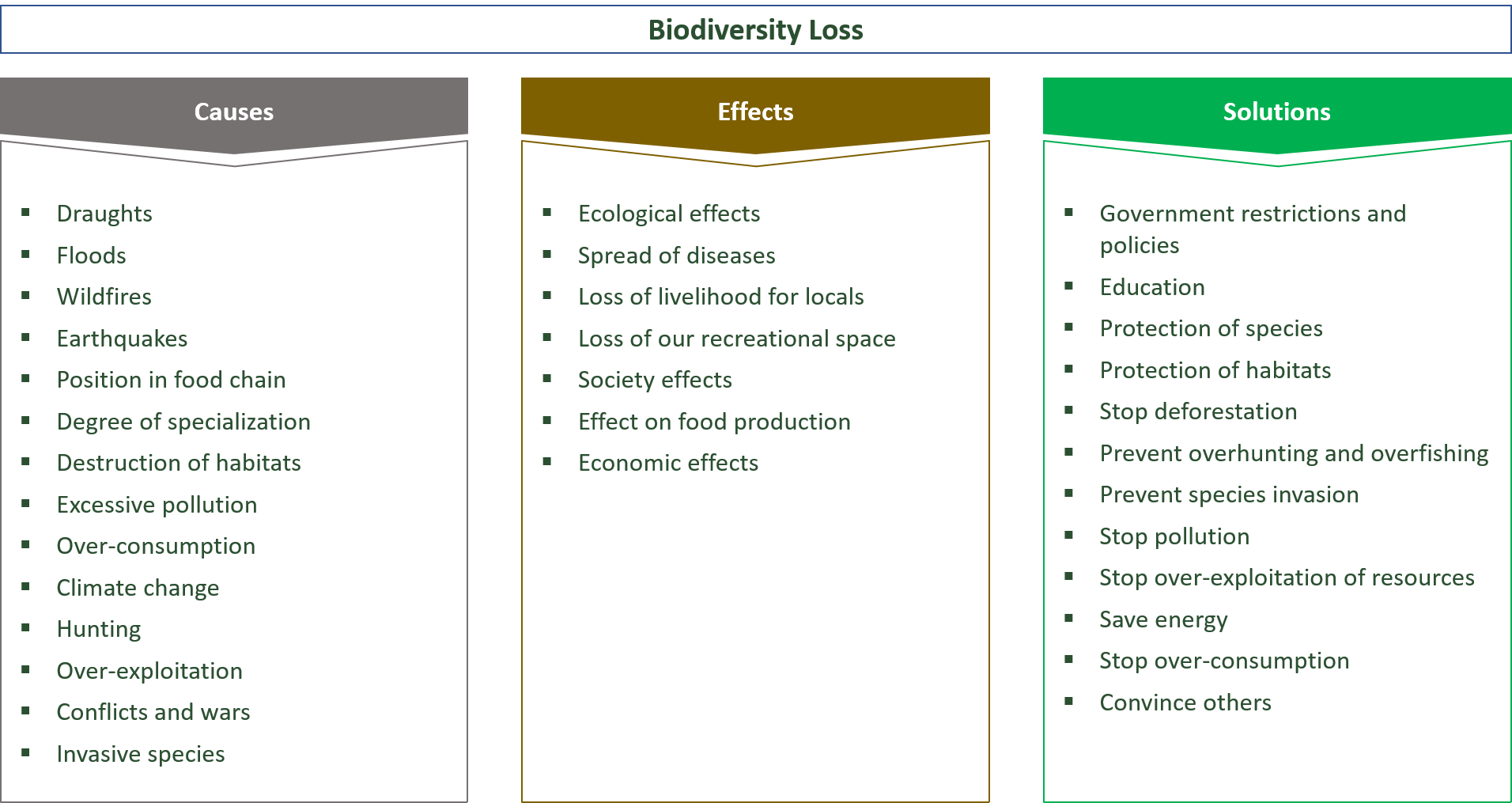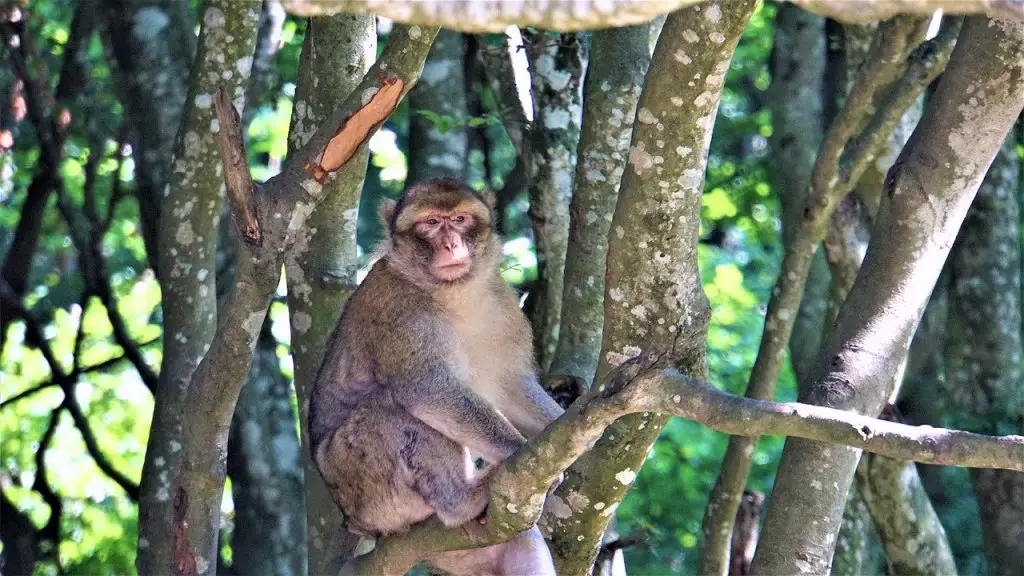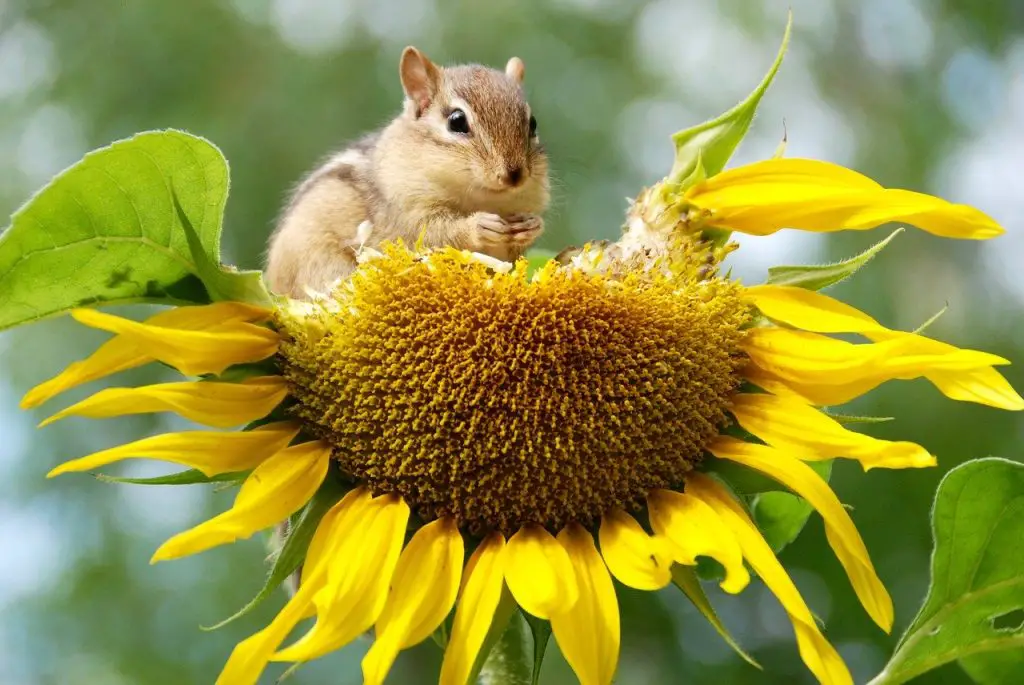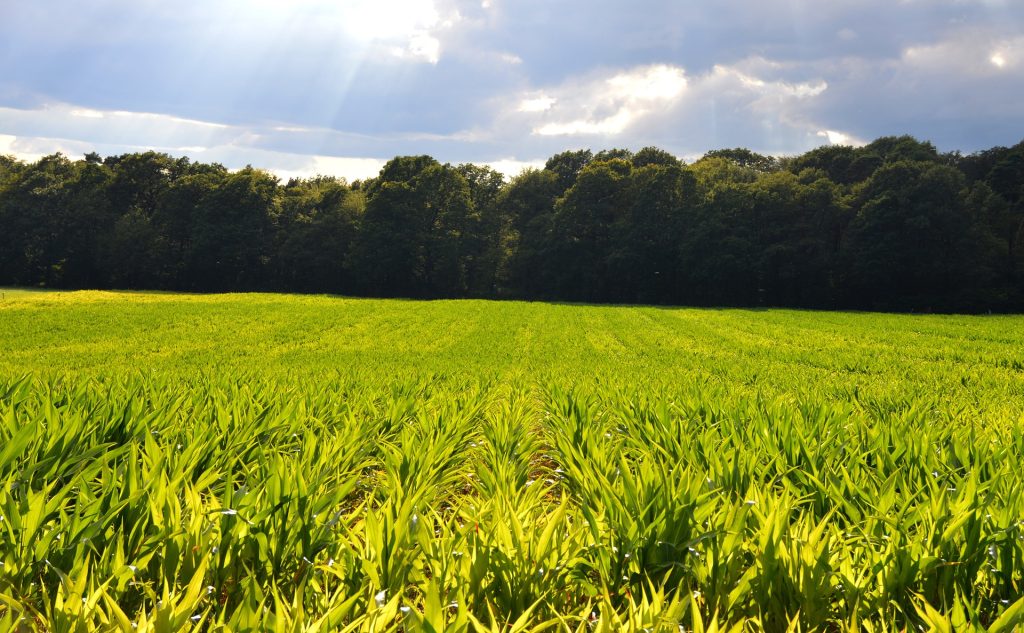“If we pollute the air, water and soil that keep us alive and well, and destroy the biodiversity that allows natural systems to function, no amount of money will save us.”
David Suzuki
Biodiversity Loss: Causes, Effects & Solutions

Biodiversity can be defined as the variability and variety of life on our planet.
This includes the variety in ecosystems, species and genetics.
The level of Biodiversity usually increases with the temperature, meaning that it is higher in warm climate zones near the equator.
As an example, the world’s tropical rainforests cover around 10% of the planet’s surface, but contain 90% of all species on the planet.
Audio Lesson
Contents
Why is Biodiversity Important?
- Support a variety of plant species
- Ecosystem balance
- Freshwater resources
- Nutrient storage
- Soil formation
- Breaking down pollutants
- Food resource
- Climatic stability
- Sustain recreation areas
- Source of drugs
Support a variety of plant species
With greater Biodiversity, the variety of plants increases.
This leads to more opportunities, especially for farmers, since they are able to plant a greater variety of crops and thus use their land more effectively.
Ecosystem balance
Our ecosystems depend on complex processes.
If only a small number of species die out, there can be a huge effect on the whole ecosystem since there are often chain effects that affect many other species.
With the preservation of Biodiversity, it can be assured that the ecosystem stays in its natural balance.
Freshwater resources
Through a variety of microorganisms and other creatures, it can be assured that freshwater resources are sustained.
Nutrient storage
Plants and other forms of vegetation store nutrients of all sorts.
When the plants are consumed by animals, these nutrients come back to the planet in a natural way.
Biodiversity is important to sustain this natural nutrition-cycle.
Soil formation
A variety of plants contributes to soil formation.
It also assures that there are enough minerals and other nutrients in the soil.
Breaking down pollutants
Through the process of photosynthesis, plants help to break down pollutants and thus clean the air.
In areas with a high wood and plant density, air quality tends to be much better than in areas with a low concentration of plants.
Food resource
A greater variety of animals and plants is useful for humanity in the sense that it provides a big selection for food sources and thus supplies all nutrients necessary for human health.
Climatic stability
Since our natural system is balanced if do not intervene too much, biodiversity protects the planet from global warming.
For example, the rainforests store huge amounts of CO2, which is classified as a greenhouse gas.
If by human actions like deforestation, this CO2 is released, it will have an adverse impact on our planet’s temperature.
Thus, protecting a variety of plants and forests helps to stabilize our climate.
Sustain recreation areas
Whether it is animals or humans, every species needs a place to rest.
It is therefore crucial that we contain the natural variety of our planet in order to provide recreational areas where people and also animals can rest and recharge.
Source of drugs
Our nature, especially our plants, provide an immense variety of substances which are used for pharmaceutical processes.
We would not be able to produce most of our drugs without extraction precious ingredients from a variety of plants.

Causes for a Loss in Biodiversity
- Draughts
- Floods
- Wildfires
- Earthquakes
- Position in food chain
- Degree of specialization
- Destruction of habitats
- Excessive pollution
- Over-consumption
- Climate change
- Hunting
- Over-exploitation
- Conflicts
- Invasive species
Draughts
Draughts are one natural source for a loss in biodiversity.
Since water is an essential prerequisite for all life on earth, a lack of water has serious consequences for all species.
Plants which have not enough water will die off or will provide smaller crop yields.
Animals will die since there organism is not able to work without water.
If the draughts continue over a long period of time, there could be a severe loss in biodiversity.
Floods
Floods are also harmful to the biodiversity of our planet.
Animals and plants do need water to survive, however, too much of it may become deadly for them as well.
Many organisms can simply drown in floods and the variety of animals and plants in the affected areas is therefore diminished.
Wildfires
Wildfires are a severe problem for biodiversity since they can kill big areas of land.
Thus, they destroy the natural food sources for animals, which have to move to other areas or they will die.
Earthquakes
Earthquakes are another serious natural cause of a loss in biodiversity.
They could kill large portions of the local wildlife.
Position in the food chain
The position in the food chain is crucial for animals to determine their likelihood of extinction.
If there are too many predators, the prey animals may almost have no chance to protect their species from extinction and thus biodiversity will be reduced.
Degree of specialization
The more specialized as species is, the more likely it is to go extinct if environmental circumstances change since they will not be able to adapt to the new circumstances appropriately.
Destruction of habitats
For many reasons, the habitats for animals and plants get destroyed by human intervention.
We need more space for building houses.
Moreover, we need more space for farming since we have to feed an increasing number of people.
This leads to a destruction of the living environment of many species.
They have to move or they will die.
This problem is especially severe when it comes to the deforestation of the rainforests.
Since 90% of all species on our planet live there, a destruction of this area will be extremely harmful to the variety of biodiversity.
Excessive pollution
Pollution is another great man-made example causing a loss in biodiversity.
There are several forms of pollution, including air and water pollution.
Air pollution can lead to health issues for animals and even for humans, resulting in health diseases which in turn could diminish the variety of species.
Moreover, water animals can be contaminated by toxic industrial by-products and thus go extinct.
This problem is especially severe for water animals which react quite sensitive to changes in the natural environment and which are not able to adjust properly and fast enough.
Over-consumption
Another problem causing a loss in biodiversity is human over-consumption.
Our consumption levels increase steadily.
However, this leads to a higher level of pollution and to a destruction of natural environments, since for a higher level of production, more resources have to be extracted out of the ground.
Thus, natural habitats are destroyed and the variety of animals and plants is diminished.
Climate change
Through the emission of CO2 and other greenhouse gases in industrial processes and also in our daily lives (like driving cars), we contribute to global warming.
Global warming leads to a loss in biodiversity since animals and plants are usually quite sensitive to changes in their natural living conditions and thus many will go extinct when these conditions change.
For example, if the ocean becomes warmer, the oxygen levels likely decrease.
However, many fishes need a high oxygen concentration to survive.
Thus, dropping oxygen levels can lead to the extinction of many fishes and other sea animals.
Hunting
Hunting, especially the hunting of endangered species, can also lead to a loss in biodiversity.
Often, animals are just hunted because of precious by-products of their existence.
For example, elephants are often killed solely because of their ivory.
Human greed can thus lead to an extinction of many species if we do not protect them properly.
Over-exploitation
Another cause of a loss in biodiversity is the over-exploitation of our planet regarding all kinds of natural resources.
Since there are many precious materials in the ground, firms want to extract them in order to make a lot of money.
However, this extraction process harms the surrounding environment, leading to a decrease in the variety of animals and plants in the affected areas.
Conflicts
Conflicts also lead to a decrease in the variety of species.
In conflicts, large areas of land can be destroyed.
Moreover, sometimes, even quite harmful chemicals are used.
These chemicals have a serious adverse impact on the ecological system, which can lead to a decline in biodiversity.
Invasive species
The introduction of invasive species can cause serious problems to the natural local ecosystems since they can carry diseases that may harm local species.
Moreover, if the invasive species are able to adapt to the new conditions properly, they may also displace local species.
Thus, the introduction of invasive species may lead to the extinction of part of the local species and therefore to a loss in biodiversity.

Effects of Biodiversity Loss
- Ecological effects
- Spread of diseases
- Loss of livelihood for locals
- Loss of our recreational space
- Society effects
- Effect on food production
- Economic effects
Ecological effects
The loss of biodiversity has severe ecological effects.
Since our planet has a natural system and species depend on each other, losing a small number of species can lead to big effects.
Predator species that lose their prey will also be in danger of extinction now if they are not able to substitute their prey species through another one.
Moreover, the extinct prey which may have consumed plants is now no longer be able to do so.
Thus, these plants will grow excessively and may dominate other plants and eventually displace them.
Spread of diseases
Due to a loss in biodiversity, diseases are likely to occur more frequently.
Since our environmental system is quite sensible and structured, removing species from the food chain can create serious trouble.
For example, if a lion kills an antelope, he will eat part of it. The remaining part will be eaten by other animals.
However, if these other animals go extinct and are no longer able to consume the rest of the antelope, it may waste and in this wasting process, several kinds of diseases can be developed.
If other animals are contaminated with these diseases, it can also spill over to humans due to our consumption of meat.
Loss of livelihood for locals
The loss of biodiversity also causes a decline in the livelihood of many locals.
This can be due to reduced crop yields or other effects. Locals may also raise cattle in order to survive.
However, if a loss in biodiversity leads to a decrease in biomass of feed, farmers will no longer be able to raise enough cattle due to the feed shortage.
Loss of our recreational space
We can also lose our recreational space as an effect of the loss of biodiversity.
Many people are stressed by their work and sometimes need space to relax.
A forest or a lake surrounded by plants may be an optimal area for this.
However, if we further destroy our forests in order to get more settlement space, we will lose many of these recreational environments.
Society effects
There are also adverse effects on our society from a loss in biodiversity.
In nowadays society, we are just so focused on computers, smartphones and other electronic stuff and lose the connection to nature which our ancestors have built in a natural way.
This loss of connection to nature may lead people to feel something is missing but they do not exactly know why since they have never been in touch with nature yet.
Moreover, nature provides a relaxing environment which if lost can lead people to become too stressed and mentally ill.
Effect on food production
A loss in biodiversity can have vast adverse effects on our food production.
Since we nowadays exploit many natural living spaces to an unhealthy degree, chances are that we lose many food sources which we could otherwise use in the future.
For example, there may be sources of food in the Amazonian rainforests which we have not even explored yet.
However, through the deforestation process, these species are likely to be lost even before we can discover them.
Thus, we rob ourselves since we will not be able to use this species in the future.
Economic effects
Apart from the environmental effects which are bad enough, a loss in biodiversity also causes adverse economic effects.
For example, if we lost bees, we would suffer from a serious decline in crop yields which would lead the GDP to collapse and would also lead to an increase in famine.

Solutions to the Biodiversity Loss Problem
- Government restrictions and policies
- Education
- Protection of species
- Protection of habitats
- Stop deforestation
- Prevent overhunting and overfishing
- Prevent species invasion
- Stop pollution
- Stop over-exploitation of resources
- Save energy
- Stop over-consumption
- Convince others
Government restrictions and policies
In order to mitigate the problem of the loss of biodiversity, governments are responsible to provide a framework that protects the natural variety of animals and plants.
Human greed is endless, thus this will not work without penalizing behavior which threatens a loss in biodiversity.
Education
We also have to educate people on how important preservation of biodiversity is for the planet as well as for humanity.
Many people are so stressed from their jobs or their social lives that they are not even aware of what a loss in biodiversity really means.
This education on biodiversity should start quite early, probably in the early school age, so that children are already of this issue quite early and can adapt their behavior into adulthood.
Protection of species
We have to protect many species from hunting or other behavior which threatens their existence.
This is especially crucial for species that are already endangered.
Species, especially animals, become endangered since people are greedy and want to make as much money as possible.
Often, just small parts of the killed animal are of interest.
For example, many elephants are killed just because of their ivory tusks.
We have to end this perverse game in order to avoid a loss of biodiversity.
A list of endangered species is given by the International Union for the Conservation of Nature.
Protection of habitats
Another related topic is the protection of habitats.
Since the human population increases, we need more settlement space and space to raise crops and cattle.
However, this leads to the destruction of natural habitats of many animals and plants.
We have to protect those habitats, since if they are destructed, these animals and plants are likely to be endangered from extinction or even go extinct.
Stop deforestation
About 90% of all species on our planet live in the tropical rainforests.
Thus, deforestation is a huge problem for the variety of species.
If we lose these forests, we will also lose many species which will have negative chain effects on the whole planet.
Prevent overhunting and overfishing
We also have to prevent overfishing and overhunting.
Since populations of many animals decline at an alarming rate, we should protect them by setting strict hunting and fishing limits.
Thus, we can make sure that populations are able to reproduce and are not becoming endangered of extinction.
Prevent species invasions
We should also be aware that invasive species can pose a serious threat to local species since they can carry many diseases that local species may not be able to deal with properly.
Moreover, invasive species may displace local ones which may lead to an extinction of part of the local plant variety.
Stop pollution
Another big responsibility for humanity is to stop or at least reduce all kinds of pollution.
Our environmental system reacts quite sensitive to changes in its natural living conditions.
Since through pollution, many ecological parameters are affected in an adverse way, pollution will contribute to a loss in biodiversity since many animals and plants will not be able to adapt to increased pollution properly and eventually go extinct.
Stop over-exploitation of resources
We should also make sure that the excessive exploitation of resources is mitigated.
Many of our industries require metals and other materials in order to fulfill their production goals.
However, by extracting these precious resources, the living space of many species will be destroyed.
Thus, we should reduce the extraction of resources in order to sustain the species‘ living space.
Save energy
Saving energy is a big contribution that everyone of us can make on a daily basis.
Whenever you don’t need light, switch it off.
There are several other occasions in our daily lives in which we can save energy.
Since energy is produced through the use of fossil fuels, the consumption of energy leads to pollution and also to global warming since large amounts of CO2 are emitted into the air.
This pollution leads to a loss in biodiversity since animals and plants become contaminated.
Thus, we can mitigate the problem of the loss of biodiversity by saving energy.
Stop over-consumption
Our daily consumption behavior also affects our environmental system to a significant degree.
In order to reduce the pollution of our environment and thus to stop the loss of biodiversity, we should be aware of how our consumption behavior adversely affects our planet.
By avoiding consumption, especially consumption which just relies on the purpose to meet the newest trends, can contribute to sustain the variety of species on earth.
Convince others
Your contribution matters!
However, you should also be aware that convincing others and making them aware of their adverse impact on the environment can make you even more powerful since you can start a „convincing chain“.
People that you have convinced may convince others.
Thus, you can have a big impact and contribute to sustaining biodiversity on our plant.
Conclusion
The loss of biodiversity can be caused by natural phenomena, however, the biggest effects come from human intervention with nature.
The loss of biodiversity causes severe adverse effects on our whole environmental system, including humanity.
It is therefore crucial to take the steps necessary in order to prevent a loss in biodiversity and thus to ensure a livable future for our children and also for a variety of animals and plants.
Sources
https://en.wikipedia.org/wiki/Biodiversity_loss
http://www.drze.de/in-focus/biodiversity/modules/biodiversity-loss
https://www.who.int/globalchange/ecosystems/biodiversity/en/

About the author
My name is Andreas and my mission is to educate people of all ages about our environmental problems and how everyone can make a contribution to mitigate these issues.
As I went to university and got my Master’s degree in Economics, I did plenty of research in the field of Development Economics.
After finishing university, I traveled around the world. From this time on, I wanted to make a contribution to ensure a livable future for the next generations in every part of our beautiful planet.
Wanna make a contribution to save our environment? Share it!
